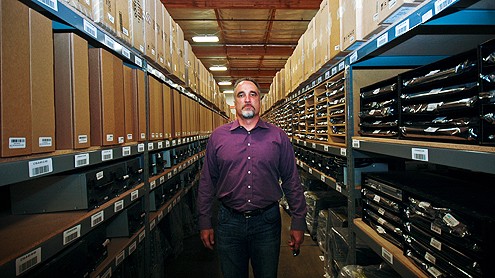Hardware sales, soft touch: NHR leverages social connections
IN THIS ARTICLE
- Features Topic
- Stephen Nellis Author
By Stephen Nellis Friday, September 16th, 2011

Michael Lodato, Network Hardware Resale’s senior vice president of sales and marketing, has helped the Goleta-based firm engineer a sales infrastructure to minimize cold calls. (Michelle Wong photo).
Goleta-based Network Hardware Resale deals in the heavy-duty switches and routers that make the Internet work. The only thing more cutting edge than the equipment is the company’s method of selling it.
Network Hardware has set out to all but eliminate the bane of the salesperson’s existence — the cold call. Each of its 90 sales staff pour data about their professional lives and connections into a system that blends it with about 30 other data sources and filters and sorts it through an in-house system woven out of technologies such as Salesforce.com and other services.
“In three minutes, you should be able to make any call warm,” said Michael Lodato, the senior vice president of sales and marketing at the firm who has spent the last year building and implementing Network Hardware’s system.
Network Hardware operates in a cutthroat, technical world. It primarily deals used gear made by Cisco, the world’s largest maker of deep network gear — the kind of stuff you’ll find in data centers, switching stations or in the basement of big corporate skyscrapers. The gear is often expensive and purchased by teams of highly trained engineers who know what they need and how much they have to spend. “These people consider themselves the architects of the Internet,” Lodato said. “They are very technical and they are very intelligent.”
But those engineers are still human, and on several levels Network Hardware’s sales operation is trying to tackle the intersection of the human element and technical specs. On the technology side, it can point to a lot of charts that show how used gear can actually be more reliable than new gear because gear usually breaks in the first 90 days if it’s going to break at all. On the human side, it’s leveraging technology to warm up to prospective customers.
Here’s how it works: Sales reps feed all of their contact data from LinkedIn and other sources into their system, which indexes them against one another three layers down. If a rep is going to make a call, he or she will search to see whether somebody knows somebody who knows somebody who might be able to make a call here or there to put in a good word for the rep or provide a name or contact to warm the call up. With everyone pulling on everyone’s contacts and experiences, the exponential power of social networking effects emerges.
“Sales 2.0 is a movement in the social media world that asks, ‘How do you leverage resources in social media to create warmer intro conversations?,” Lodato said.
A lot of other data goes into the process from sources such as Jigsaw, NetProspect and even online streaming music service Pandora. (Wonder why you might have been offered a particularly prescient pair of concert tickets by a friendly marketing rep last week? Now you know.)
But Lodato said that much data is needed because even in large organizations, it’s only a few people who can really pull the trigger on a big purchase. He gives the example of a $2.7 billion company that Network Hardware is targeting. “There’s two guys in the whole place we need to know. Everyone else leads to them,” Lodato said.
But what incentive does a salesperson have to open up his virtual Rolodex to a colleague when commissions are on the line?
There are rules. At Network Hardware, an account is locked in for at least a year if a rep is actively working it, and if you want to tap another rep’s contact, you must go through that rep to do so. While Lodato couldn’t get into details of how compensation is structured, he called it “for salespeople, by salespeople” and said his top team netted $1.8 million in commissions last year.
“As long as you’re protected, people will share,” Lodato said. “What you need is a quid pro quo. These things have been discovered before, it just took forever. You have to have really good sales policies in place and really good data to keep people from stepping on other people’s toes.”
The melding of the human element with technology is a natural fit for Lodato. He was a programmer and developer before going into sales. He built Network Hardware’s system on services from Salesforce.com and InsideView, where he knew early key executives who shed light on the systems’ potential. And it’s in his blood. His father was the author of “Selling Computers and Software: The MASTER Method,” a 1983 book on technology sales. “When I was 8, I was helping him get ready for seminars. You couldn’t go through a day without him interpreting something as a sales process,” Lodato said.










